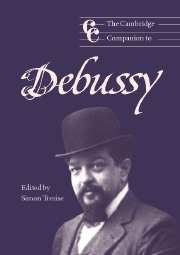Book contents
- Frontmatter
- Introduction
- Part I Man, musician and culture
- Part II Musical explorations
- 4 Debussy on stage
- 5 The prosaic Debussy
- 6 Debussy and expression
- 7 Exploring the erotic in Debussy's music
- 8 Debussy and nature
- Part III Musical techniques
- Part IV Performance and assessment
- Notes
- Select bibliography
- Index
8 - Debussy and nature
from Part II - Musical explorations
Published online by Cambridge University Press: 28 September 2011
- Frontmatter
- Introduction
- Part I Man, musician and culture
- Part II Musical explorations
- 4 Debussy on stage
- 5 The prosaic Debussy
- 6 Debussy and expression
- 7 Exploring the erotic in Debussy's music
- 8 Debussy and nature
- Part III Musical techniques
- Part IV Performance and assessment
- Notes
- Select bibliography
- Index
Summary
Debussy liked to give the impression that he was a reluctant reviewer of concerts. Often, prior to giving his assessment of a particular performance, he writes of the beauty of the day on which the concert took place, unfavourably comparing his delight in nature with his unfortunate obligation to attend the concert. In an article written for La revue blanche in 1901, Debussy wrote of being in the countryside, far from artistic debates, the first performances of new works and everything else associated with the Parisian musical world. He wrote:
I was alone and deliciously disinterested; perhaps I had never loved music more than at that moment, when I never heard anyone talk about it. It appeared to me complete, in all its beauty, not in overheated or stingy little symphonic or lyric fragments.
Debussy often said that he disliked analytical approaches to music (in common with many composers), and he was quite naturally irritated by uninformed discussion about music. Moreover, his love of nature was coupled with a misanthropic streak. I suspect that he preferred the open spaces and silence of the countryside (a silence broken only by the sounds of wind, water and other natural phenomena) to the company of his fellow human beings.
Later in this article Debussy stresses that he believes the Prix de Rome competition is ridiculous, implying that this competitive approach to composition is unnatural. Music, for him, should be a part of nature, or something sharing its characteristics; on many occasions he expressed his distaste for academic forms and harmonic formulae.
- Type
- Chapter
- Information
- The Cambridge Companion to Debussy , pp. 137 - 152Publisher: Cambridge University PressPrint publication year: 2003
- 4
- Cited by

